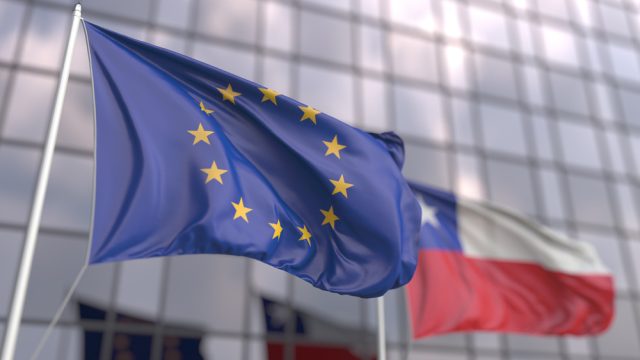
The modernisation of the agreement between the European Union (EU) and Chile has been hailed by Emmanuel Macron as a model for European trade policy. The French president described it as a “next-generation” treaty, emphasising its alignment with European values of sustainability and mutual cooperation. However, the broader global context and the EU’s strategic decisions call for a more critical analysis of this treaty and its implications for European autonomy.
According to Macron, the treaty represents a balance between strategic interests and shared values. Yet beneath these declarations lies a significant contradiction: in its pursuit of strategic autonomy, Europe appears to be deepening its reliance on third countries. Specifically, the EU’s access to Chile’s lithium, copper, and green hydrogen is framed as indispensable for Europe’s energy transition, raising questions about the coherence of its policies.
The transition to a green economy has turned Europe into a voracious consumer of strategic natural resources. Minerals such as lithium, crucial for the technology sector and the production of electric batteries, are at the core of this demand. Instead of prioritising the development of internal capacities, the EU has opted for bilateral agreements, such as the one with Chile, to secure access to these raw materials.
However, this strategy reinforces a dependency on external actors that runs counter to the EU’s stated goal of achieving genuine strategic autonomy. While Europe is attempting to reduce its dependence on China in certain sectors, it is simultaneously forging new dependencies with other nations. This raises an essential question: is the EU building true independence or merely diversifying its vulnerabilities?
The enthusiasm for the Chile agreement stands in stark contrast to the rejection of the MERCOSUR treaty, exposing deep divisions within the EU. France, for example, has strongly opposed the deal with the South American bloc, citing concerns over unfair competition in sectors such as agriculture. Macron has portrayed the MERCOSUR-EU treaty as a threat to European farmers, whereas the Chile agreement is perceived as less intrusive to French national interests.
These tensions underscore the lack of unity in European trade policy. Germany and Spain, in contrast to France, support the MERCOSUR agreement, recognising the economic benefits for their industrial sectors. France’s protectionist stance, however, clashes with the narrative of openness and sustainability often championed by Brussels.
Macron has positioned the Chile agreement as a tool aligned with the EU’s sustainability objectives, incorporating environmental and social commitments as part of an innovative treaty framework. Yet this approach highlights the EU’s double standards. While imposing stringent environmental standards on its trading partners, the bloc has not made significant strides to reduce its own dependence on external resources. Offloading the burdens of the energy transition onto third countries, often with detrimental social and environmental impacts, undermines the values the EU purports to uphold.
The implementation process of the agreement has also attracted criticism. Although full ratification by national parliaments is required for the treaty to take full effect, an interim mechanism has been approved, enabling its provisional application with only the European Parliament’s endorsement. This approach, designed to bypass potential political roadblocks, has been interpreted as an attempt to circumvent democratic debate at the national level.
For European citizens, this perception of opacity and lack of consultation fosters distrust in EU institutions. A trade policy that prioritises administrative efficiency over public consensus risks being unsustainable in the long term.
The Chile-EU agreement reflects the internal tensions and contradictions within Europe’s broader strategy. While the bloc aspires to position itself as a global leader in sustainability and the energy transition, its actions reinforce dependency dynamics that undermine its goal of strategic autonomy. The lack of a shared vision within the EU—evident in the divisions over MERCOSUR—and the questionable decision-making processes surrounding trade agreements cast doubt on the bloc’s ability to function as a coherent and credible global actor.



 Subscribe
Subscribe